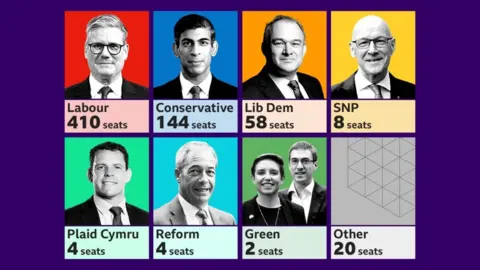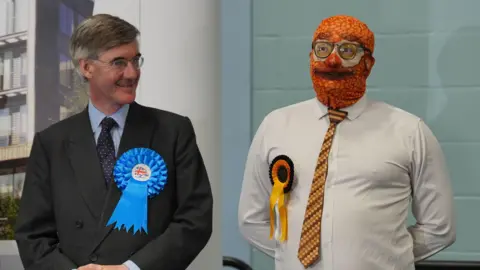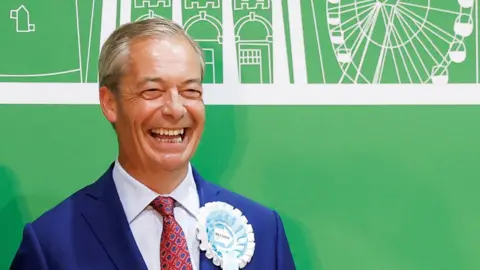The Labour Party has won the UK general election and Sir Keir Starmer will become the new prime minister.
The result ends 14 years of Conservative government, during which five different prime ministers have run the country.
Rishi Sunak, the outgoing PM, conceded at around 04:40 in the morning, acknowledging Labour had won and saying that he had called Sir Keir to congratulate him.
In his victory speech minutes later, the Labour leader promised “national renewal” and that he would put “country first, party second”.
The former chief prosecutor and human rights lawyer has reason to be happy – his party is going to win a huge majority in Parliament.
On the other side, Robert Buckland, a former Conservative minister who lost his seat, described it as “electoral Armageddon” for the Tories.
It’s been a long night of results and there’s plenty more action to come. Here’s what’s happening, and what it all means.
A huge Labour victory
Britain’s House of Commons has 650 MPs, or members of parliament. Each of their “seats” represents an individual constituency – or area – somewhere in the country.
Our latest BBC forecast says Labour will win 410 seats, the Conservatives will pick up 144 and centrist Lib Dems will take 58. Reform UK, a successor to the Brexit Party, is set to pick up four seats.
The expected 170-seat majority in the House of Commons for Labour is an enormous number but still short of the majority of 179 won by the party under Tony Blair in the 1997 election.
But for more perspective, the Conservatives’ win in the 2019 election under Boris Johnson – seen as a very strong performance – saw them get a majority of 80 seats.
A reminder: If a party holds a majority, it means it doesn’t need to rely on other parties to pass laws. The bigger the majority, the easier it is.

Big names fall one by one (but some survive)
As constituencies have declared their results live on television – with all candidates lined up next to each other on stage – there have been some major moments.
Jacob Rees-Mogg, the former Conservative business secretary and arch-Brexiteer, was one of the biggest names to suffer defeat. He lost his East Somerset and Hanham seat to Labour.
He told the BBC that he couldn’t “blame anybody other than myself” for the loss but he took a “small silver lining” from the fact that the Conservatives would be “at least the official opposition” – a reference to fears they wouldn’t even have that.
Grant Shapps, the defence secretary, looked rattled after losing his seat in southern England.
Leader of the House Penny Mordaunt, who ran against Rishi Sunak for the party leadership before he became prime minister, also lost her seat.
Jeremy Hunt, who serves as chancellor – the UK equivalent of a finance minister – held on to his seat but with a much-reduced majority.
Mr Sunak also won his seat in Yorkshire with a comfortable majority of around 12,000 – but used his acceptance speech to concede and confirm his party had lost the election.
But hold tight, we’re still waiting for the results in some other big contests.
Liz Truss, who was prime minister for less than two months between Boris Johnson and Rishi Sunak, faces a tough battle in her South West Norfolk constituency.

A new PM within a day
Things move pretty fast in British politics – there is very little time between an election result and the installation of the new prime minister.
Rishi Sunak will be out of 10 Downing Street – the British equivalent of the White House – within 24 hours, and Sir Keir Starmer will be installed swiftly afterwards.
But there is a process. Mr Sunak will offer his resignation to the King, and Sir Keir will formally invited by the monarch to form the next government in a meeting that normally happens at Buckingham Palace.
So who is Keir Starmer?
He’s fairly new to politics, relatively speaking.
Sir Keir started his professional life as a barrister in the 1990s, and was appointed the director of public prosecutions, the most senior criminal prosecutor in England and Wales, in 2008.
He was first elected in the Holborn and St Pancras constituency in north London in 2015, and took over leadership of Labour after the party’s poor 2019 general election, pledging to start a “new era” after the left-wing leadership of Jeremy Corbyn.
Sir Keir was re-elected in the same constituency on Thursday, saying in his victory speech people were “ready for change” and promising an “end the politics of performance”.
“The change begins right here because this is your democracy, your community, your future,” he said. “You have voted. It’s now time for us to deliver.”
You can read Sir Keir’s full profile here.
Nigel Farage finally becomes an MP

This election’s insurgent party was Reform UK, the right-wing successor to the Brexit Party and the UK Independence Party.
Nigel Farage, its leader, finally won a seat on his eighth attempt – but his party’s initial projection of 13 seats fizzled to four. That’s still better than UKIP and the Brexit Party ever did, and Mr Farage has been celebrating.
The party’s share of the vote looks to be about 14%.
Reform drew controversy during the campaign over offensive statements made by some of its candidates and activists.
Mr Farage will be joined in the House of Commons by former Conservative party deputy chairman Lee Anderson, Reform founder Richard Tice and Rupert Lowe.



